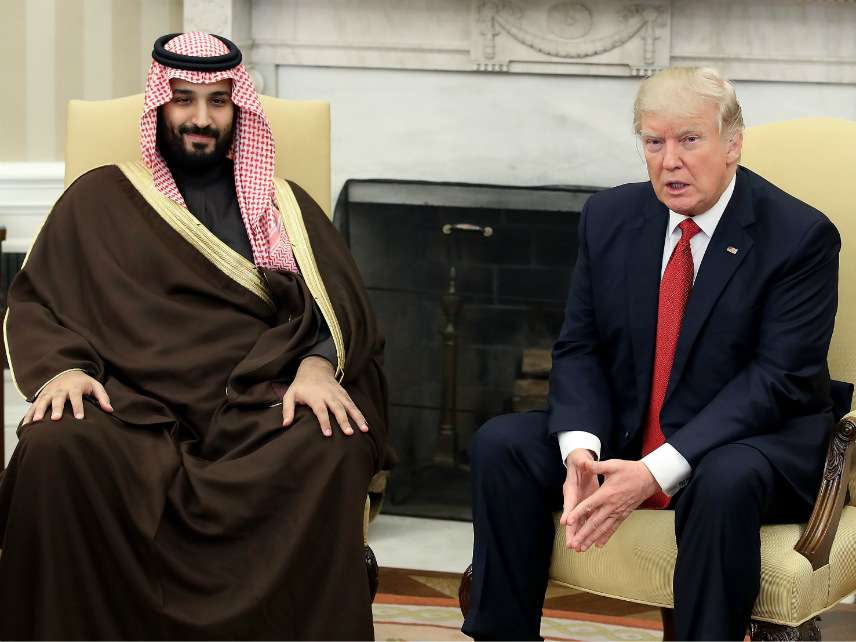The Saudis Need Us, Not the Other Way Around
The U.S. should not let its foreign policy be dictated by threats from Saudi Arabia, or anyone else.

More than ten days after Saudi dissident and Washington Post columnist Jamal Khashoggi disappeared after entering the Saudi consultate in Istanbul, Riyadh is reportedly preparing to admit some culpability for the journalist's death. On orders from President Trump, Secretary of State Mike Pompeo traveled to Saudi Arabia to meet with King Salman and Crown Prince Mohammed bin Salman about the case directly. The State Department described the talks as "direct and candid;" given the egrecious nature of the crime—ambushing a journalist and permanent U.S. resident in a diplomatic facility, torturing him, murdering him, and disposing of him with a bone-saw—one can only hope the Pompeo read the Saudi royal family the riot act.
At the same time the Saudis are feigning cooperation with an investigation into Khashoggi's disappearance, Riyadh is warning of retaliation in the event Washington issues sanctions on the Kingdom. Turki Aldakhil, the general manager of Saudi-owned Al-Arabiya, bluntly warned that higher oil prices could soon be coming down the pike: "If the price of oil reaching $80 angered President Trump, no one should rule out the price jumping to $100, or $200, or even double that figure."
As the Middle East's top oil exporter and the second largest oil producer in the world, a decision by Saudi Arabia to cut production would inevitably raise the price of crude substantially. Over a span of months, Americans would be paying more for gas at the pump. Yet Riyadh would be vastly overstating its leverage if it believed a medium-sized regional state like Saudi Arabia could for a moment dictate policy to the United States, the world's largest economy and military power.
Over the long-term, inflating oil prices would be a disaster to Saudi Arabia's economy and a public relations nightmare for the media-conscience Kingdom. Riyadh cannot guarantee one of its competitors would not increase its own exports and steal market share underneath its feet. For a country like Saudi Arabia—which is almost totally dependent on oil sales to finance the extensive welfare benefits it provides for its population—losing market share is an unsustainable situation. With less revenue coming in, the Saudi government would either have to tax a population used to receiving free education and healthcare, dip into its foreign exchange reserves (getting lighter since 2015), or begin freezing a bloated public sector that has served as a job program for young Saudis entering the workforce. Neither option is positive in terms of Saudi Arabia's domestic tranquillity.
It is a safe assumption that Saudi Arabia's stock in the West would also plummet, both in diplomatic circles and in the business world, as potential investors start looking for opportunities elsewhere.
Riyadh would like the Trump administration to think that the U.S. needs Saudi Arabia more than Saudi Arabia needs the U.S. The reality could not be any different.
There was a time earlier in the century when the U.S. was as an addicted consumer of Saudi oil. To Riyadh's disappointment, that is no longer the case. As America's own oil production has gone up, its imports of Saudi oil have gone down. According to U.S. government statistics, U.S. imports of Saudi crude in 2017 decreased by 14 percent from the previous year, reaching the lowest rate since 1988. Riyadh accounts for only 9 percent of America's total crude imports, a shell of a figure compared to Canada's 40 percent. Because U.S. purchases are already decreasing, a hypothetical Saudi slowdown in production—or even an outright cutoff—would have far less of an impact. While the Saudis like to brandish oil as a weapon in its arsenal, the weapon is losing much of its luster.
Since Saudi officials rely so much on oil proceeds to pad their budget, they may choose to retaliate in another way: downgrading its diplomatic and intelligence relationship with Washington. Such a downgrade would cause concern in Washington as U.S. policymakers, particularly those responsible for counterterrorism, calculate the impact of weaker collaboration.
This course of action, however, would also be far from cost-free for the Saudi state. Indeed, if Riyadh were brash enough to cut off diplomatic relations or intelligence partnerships, Saudi Arabia's already buckling credibility on Capitol Hill would plateau to an extent the Kingdom would be unprepared to manage. The Saudis, even under a gambler like the 33-year old bin Salman, would be unlikely to spark the ire of Congress and jeopardize their access to U.S. military hardware, training, and technology, particularly when Riyadh is currently fighting in the fourth year of a war in Yemen that, charitably put, is a stalemate. And while the Saudis could lessen their dependence on American equipment by switching to Russian and Chinese suppliers, such a transition would not happen overnight. It would require the kind of time Riyadh is unwilling to spend in the current threat environment.
The killing of a journalist is an unconscionable act, especially when the assailant is a supposed U.S. friend. U.S.-Saudi ties, however, were never founded upon friendship, shared values, a mutual sense of ethics, or a common history. They were founded upon pragmatism and realpolitik. If the pragmatism is wearing off, or the other party is acting counter to U.S. interests, Washington should reassess the assumptions underlying the partnership.
Notwithstanding the dubious and changing explanations from the Saudi royal family about what happened to Jamal Khashoggi, this is a seminal moment for President Trump as a world leader. The message from the U.S. government across the board must meet the occassion: while the administration desires constructive relations with the Kingdom, its interests will always be surpassed by those of the American people. Just the same: U.S. policy in the Middle East from now on will independent from any one country, flexible, and untethered from the region's power struggles.
